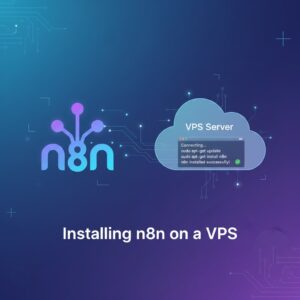
What is n8n and Why Use Docker for Installation?
n8n is a powerful open-source workflow automation tool that helps you connect different applications and automate repetitive tasks. Installing n8n using Docker on your VPS server provides the easiest, most reliable deployment method with isolated environments, simple updates, and consistent performance.
Key benefits of hosting n8n with Docker on VPS:
- One-command installation and updates
- Complete data control and privacy
- No workflow execution limits
- Isolated and secure environment
- Easy backup and migration
- Consistent performance across systems
Prerequisites
Before installing n8n with Docker on your VPS, ensure you have:
- Linux VPS server (UnixHost Pro VPS recommended – reliable and affordable)
- Ubuntu 20.04 or newer (or Debian/CentOS)
- Minimum 2GB RAM (4GB+ recommended for production)
- Root or sudo access
- Domain name (optional, but recommended for SSL)
Step 1: Connect to Your VPS Server
First, connect to your VPS via SSH:
ssh root@your_server_ipReplace your_server_ip with your actual VPS IP address.
Step 2: Update System Packages
Keep your system secure and up-to-date:
sudo apt update && sudo apt upgrade -yStep 3: Install Docker and Docker Compose
Install Docker using the official script:
curl -fsSL https://get.docker.com -o get-docker.sh
sudo sh get-docker.shVerify Docker installation:
docker --versionInstall Docker Compose:
sudo apt install docker-compose -yVerify Docker Compose:
docker-compose --versionEnable Docker to start on boot:
sudo systemctl enable docker
sudo systemctl start dockerStep 4: Create n8n Directory Structure
Create a dedicated directory for n8n data:
mkdir -p ~/.n8n
cd ~/.n8nThis directory will store your workflows, credentials, and database.
Step 5: Create Docker Compose Configuration
Create a docker-compose.yml file:
nano docker-compose.ymlAdd the following configuration:
version: '3.8'
services:
n8n:
image: n8nio/n8n:latest
container_name: n8n
restart: always
ports:
- "5678:5678"
environment:
- N8N_BASIC_AUTH_ACTIVE=true
- N8N_BASIC_AUTH_USER=admin
- N8N_BASIC_AUTH_PASSWORD=your_secure_password_here
- N8N_HOST=${N8N_HOST:-localhost}
- N8N_PORT=5678
- N8N_PROTOCOL=http
- NODE_ENV=production
- WEBHOOK_URL=http://your_domain.com/
- GENERIC_TIMEZONE=Europe/London
volumes:
- ./n8n_data:/home/node/.n8n
networks:
- n8n-network
networks:
n8n-network:
driver: bridgeImportant: Replace your_secure_password_here with a strong password and update your_domain.com with your actual domain.
Save the file (Ctrl+O, Enter, Ctrl+X).
Step 6: Start n8n with Docker
Launch n8n using Docker Compose:
docker-compose up -dCheck if the container is running:
docker psView n8n logs:
docker logs n8n -fBy default, n8n runs on port 5678. Access it via: http://your_server_ip:5678
Step 7: Configure Nginx Reverse Proxy (Recommended)
Install Nginx:
sudo apt install nginx -yCreate Nginx configuration:
sudo nano /etc/nginx/sites-available/n8nAdd this configuration:
server {
listen 80;
server_name your_domain.com;
location / {
proxy_pass http://localhost:5678;
proxy_http_version 1.1;
proxy_set_header Upgrade $http_upgrade;
proxy_set_header Connection 'upgrade';
proxy_set_header Host $host;
proxy_set_header X-Real-IP $remote_addr;
proxy_set_header X-Forwarded-For $proxy_add_x_forwarded_for;
proxy_set_header X-Forwarded-Proto $scheme;
proxy_cache_bypass $http_upgrade;
}
}Enable the site:
sudo ln -s /etc/nginx/sites-available/n8n /etc/nginx/sites-enabled/
sudo nginx -t
sudo systemctl restart nginxStep 8: Secure n8n with SSL Certificate
Install Certbot for free SSL:
sudo apt install certbot python3-certbot-nginx -yObtain SSL certificate:
sudo certbot --nginx -d your_domain.comUpdate your docker-compose.yml to use HTTPS:
nano docker-compose.ymlChange the environment variables:
- N8N_PROTOCOL=https
- WEBHOOK_URL=https://your_domain.com/Restart n8n:
docker-compose down
docker-compose up -dStep 9: Configure Firewall
Allow necessary ports:
sudo ufw allow 22/tcp
sudo ufw allow 80/tcp
sudo ufw allow 443/tcp
sudo ufw enableStep 10: Access Your n8n Installation
Visit your domain: https://your_domain.com
Log in with the credentials you set in docker-compose.yml and start creating workflows!
Step 11: Managing n8n with Docker
Stop n8n:
docker-compose stopStart n8n:
docker-compose startRestart n8n:
docker-compose restartUpdate n8n to latest version:
docker-compose pull
docker-compose up -dView logs:
docker logs n8n -fBackup n8n data:
tar -czf n8n-backup-$(date +%Y%m%d).tar.gz ./n8n_dataAdvanced Configuration: PostgreSQL Database
For better performance in production, use PostgreSQL instead of SQLite:
Create an updated docker-compose.yml:
version: '3.8'
services:
postgres:
image: postgres:15-alpine
container_name: n8n-postgres
restart: always
environment:
- POSTGRES_USER=n8n
- POSTGRES_PASSWORD=your_db_password
- POSTGRES_DB=n8n
volumes:
- ./postgres_data:/var/lib/postgresql/data
networks:
- n8n-network
healthcheck:
test: ['CMD-SHELL', 'pg_isready -h localhost -U n8n']
interval: 5s
timeout: 5s
retries: 10
n8n:
image: n8nio/n8n:latest
container_name: n8n
restart: always
ports:
- "5678:5678"
environment:
- DB_TYPE=postgresdb
- DB_POSTGRESDB_HOST=postgres
- DB_POSTGRESDB_PORT=5432
- DB_POSTGRESDB_DATABASE=n8n
- DB_POSTGRESDB_USER=n8n
- DB_POSTGRESDB_PASSWORD=your_db_password
- N8N_BASIC_AUTH_ACTIVE=true
- N8N_BASIC_AUTH_USER=admin
- N8N_BASIC_AUTH_PASSWORD=your_secure_password
- N8N_HOST=${N8N_HOST:-localhost}
- N8N_PORT=5678
- N8N_PROTOCOL=https
- NODE_ENV=production
- WEBHOOK_URL=https://your_domain.com/
- GENERIC_TIMEZONE=Europe/London
volumes:
- ./n8n_data:/home/node/.n8n
networks:
- n8n-network
depends_on:
postgres:
condition: service_healthy
networks:
n8n-network:
driver: bridgeApply the configuration:
docker-compose down
docker-compose up -dPerformance Optimization Tips
Increase Docker container resources:
Add to your docker-compose.yml under the n8n service:
deploy:
resources:
limits:
cpus: '2'
memory: 2G
reservations:
memory: 1GEnable Docker logging limits:
logging:
driver: "json-file"
options:
max-size: "10m"
max-file: "3"Use Docker volumes for better performance:
volumes:
n8n_data:
postgres_data:Troubleshooting Common Issues
Container not starting:
docker logs n8n
docker-compose logs -fCheck container status:
docker ps -aReset n8n completely:
docker-compose down -v
docker-compose up -dDatabase connection issues:
docker exec -it n8n-postgres psql -U n8n -d n8nPermission issues:
sudo chown -R 1000:1000 ./n8n_dataWhy Choose UnixHost Pro for n8n Docker Hosting?
When selecting a VPS provider for n8n Docker deployment, UnixHost Pro VPS offers:
- High-performance SSD storage for Docker volumes
- Optimized for containerized applications
- Reliable uptime and fast network
- Flexible resource scaling
- Pre-configured Docker support
- Competitive pricing
- Expert technical support 24/7
Conclusion
Installing n8n with Docker on your VPS server provides the most efficient and maintainable workflow automation setup. With Docker, you get easy updates, simple backups, and isolated environments. Following this guide, you can have a production-ready n8n instance running in under 15 minutes.
Ready to automate your workflows with Docker? Get started with a reliable Linux VPS from UnixHost Pro today!
Keywords: n8n docker installation, docker compose n8n, VPS automation, workflow automation docker, n8n VPS setup, Linux VPS docker, n8n container, automation tools, self-hosted n8n, n8n docker tutorial, VPS hosting, docker deployment, containerized n8n